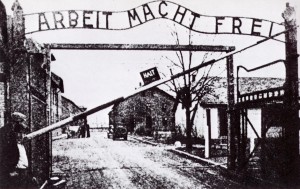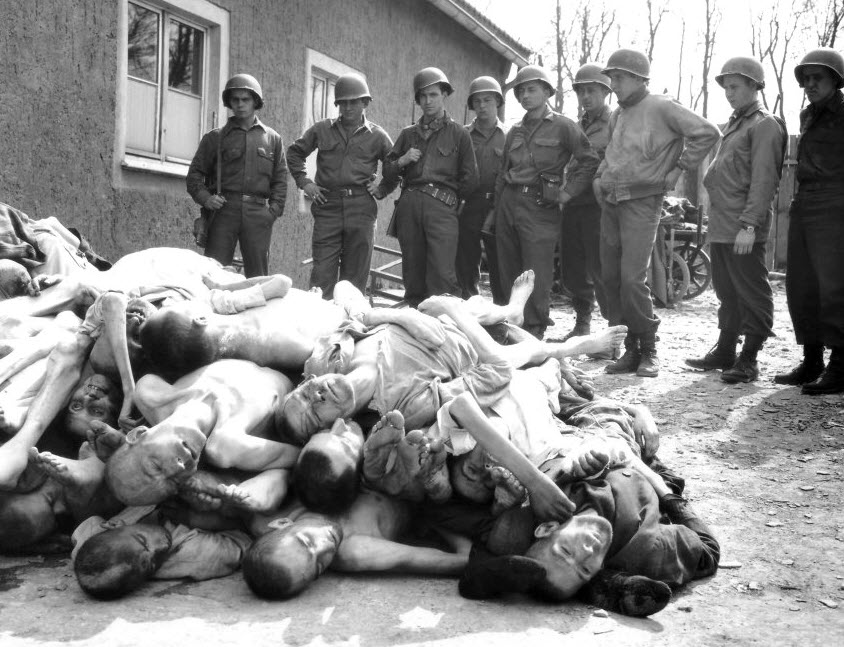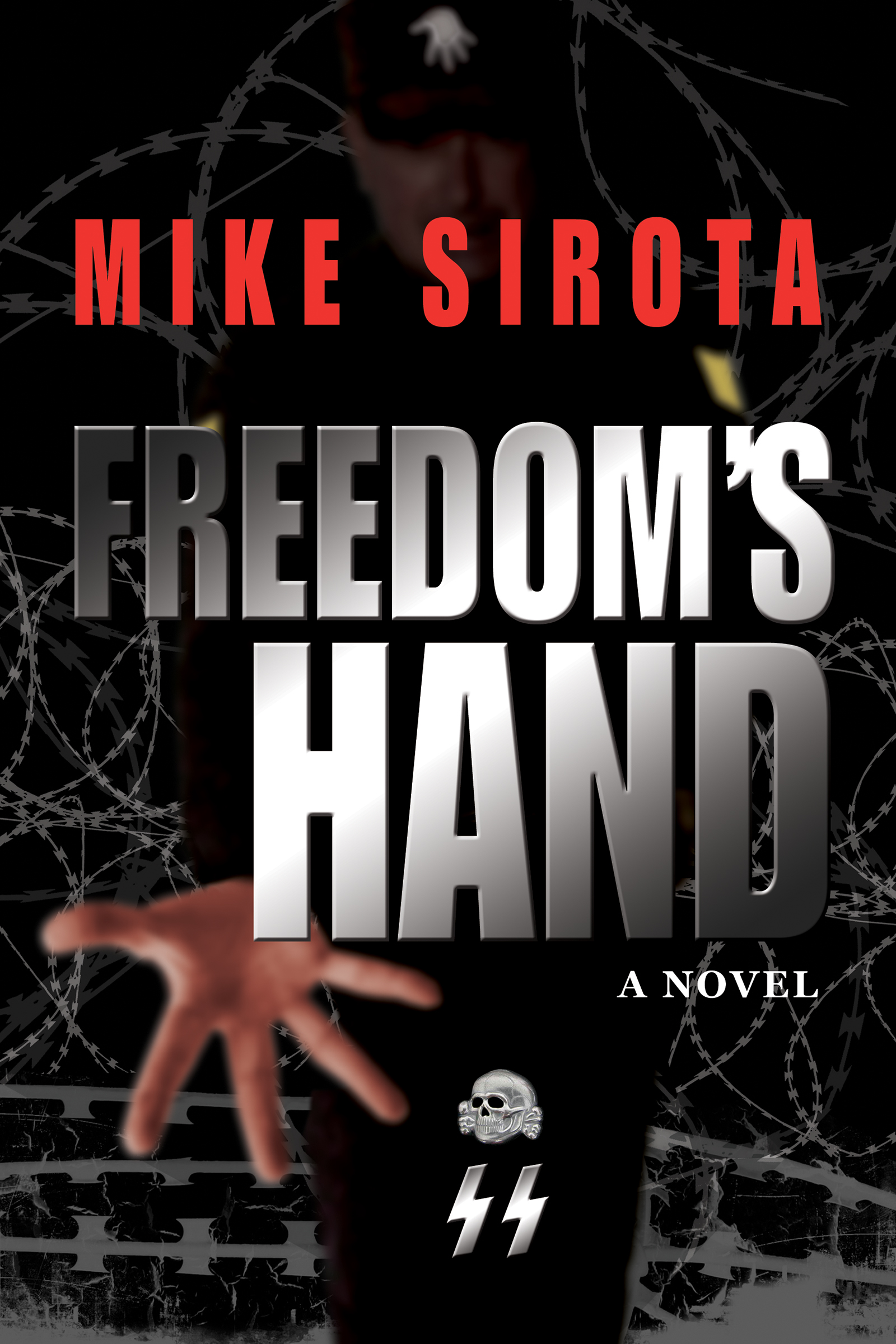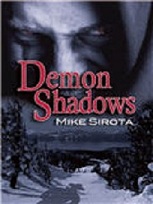In my last post I promised to share some more transitions from my novel, FREEDOM’S HAND, to show how this necessary device can strengthen a writer’s story. It’s time to pay off.
The early scene where Nathan Adler and the Lowe family first arrive at Lager, the desert concentration camp built by the white supremacist group, Freedom’s Hand, is a lengthy one, with no transitions. Nathan, who survived Auschwitz fifty years earlier, is within himself, not willing to believe the nightmare is happening again. Then, the camp’s “technical advisor,” an old man named Heinz Kell, confronts Nathan and comments on his sturdy appearance.

Auschwitz gate: “Work sets you free.”
The words ripped through Nathan’s apathy. A haze began to dissipate; slowly. But before he could see, he heard.
And he knew.
“Kell! Gott in himmel, it’s Kell! No!”
The German looked at the Commander, who said, “It appears you found a friend. An old one, no doubt.”
No more haze. Alert, Nathan’s eyes met those of the other. In Nathan there smoldered an emotion beyond hatred, an aching of the soul more malignant than any cancer.
“It’s true! It is Kell!”
The German was curious. “Where do you know me from?”
Fists clenched, Nathan turned his left arm, revealing the indelible tattoo of numbers.
Kell nodded, and for the first time smiled.
A space break/transition takes us back half a century to…
Early winter in southwest Poland. It had been a cold, threatening day. But even with occasional rain, the dark smoke of the crematoriums had risen without pause since before dawn.
Nathan Adler and the rest of his Kommando had been transporting bodies from the gas chambers to the pits behind one of the crematoriums. In his four months there, it was the worst thing he had to do. Some of the men in his  work detail did not care anymore. Mussulmans, they were called. Emotionally dead, their bones protruded through skin that was like dried paper, causing terrible sores that festered and smelled vile. Tomorrow, or the next day, it would be their bodies thrown on the pile.
work detail did not care anymore. Mussulmans, they were called. Emotionally dead, their bones protruded through skin that was like dried paper, causing terrible sores that festered and smelled vile. Tomorrow, or the next day, it would be their bodies thrown on the pile.
The gassing had been stepped up; new arrivals to the Auschwitz-Birkenau compound were being put to death in droves. Promises of a warm shower and well-paid work afterward were no longer made. They were crammed into the rooms by force. With an allocation of twenty minutes for the incineration of every three corpses, the pits were becoming more filled.
Heinz Kell tortured and murdered countless prisoners in Auschwitz and was Nathan’s primary tormentor. The flashback ends with Kell doing something unimaginable to Nathan, and another transition takes us back to the contemporary story and a continuation of their confrontation. I won’t reveal what happens there.
Flashbacks are key later on in FREEDOM’S HAND as a means of showing readers how the Commander, a hate-filled man and the architect of Lager, became the monster that he did, all the way back to when he was a small boy. But the transitions to those past scenes don’t have to be dull and stiff. We learn early on that the Commander’s  first name is Martin, and the flashbacks are preceded with him talking to his friend and second in command, Lewis Hanfield. For example, Martin has just quoted a passage from Hitler’s writings and says that der Fuhrer would have exterminated all inferior races.
first name is Martin, and the flashbacks are preceded with him talking to his friend and second in command, Lewis Hanfield. For example, Martin has just quoted a passage from Hitler’s writings and says that der Fuhrer would have exterminated all inferior races.
Hanfield nodded. “So now someone else has to do it.”
The Commander stood, his face red. He had not heard what Hanfield said. “Can you hear me, Lewis?” he exclaimed. “It might have been a perfect world already! Can you hear me?”
“Yes, Martin.”
“Can you hear me?”
##
“Can you hear me, Martin?”
“Yes, Mother.”
“Can you hear me?”
“I’m down here.”
The boy waited at the bottom of the long, carpeted stairway. Descending with practiced steps the tall, elegant woman continued past the landing where she often paused for effect, joining him. The smile that millions loved was, now, just his.
Later on, the Commander and Hanfield are studying plans for—something unimaginable. Notice the transition from one “hot day” to another:
“The elimination phase!” he exclaimed, turning. “If we escalate the collections, then it must be the same for that.”
Hanfield nodded. “I have the blueprints.”
“Let me see them.”
Hanfield pulled a cardboard mailing tube off a shelf and loosened an end cap. “It’s almost exactly as you and Kell conceived it, Martin. Only technical changes. Improvements, if you will.”
The Commander smiled. “Spread it out here, Lewis. I’ll get us something cold to drink. It’s such a hot day.”
##
They weren’t supposed to bury the dead on hot days. Funerals were open umbrellas and cool, steady rain beading on shiny black limousines, and a hurried service so that no one would have to stand in it for too long. Hot days were beaches, baseball, shady picnics, not people in dark clothes and ties and veils swearing at the corpse for being inconsiderate.
The young man stood at graveside between his father and his mother’s sister. A rainbow of flowers engulfing the casket gave a false image of life and vibrancy. He chose instead to stare at the black, yawning hole, which put into better perspective the reason why they were all there that morning.
The examples above were all transitions within chapters. But a transition from one chapter to another can also be effective. I present the following one because a number of readers have commented on the fact that it stood out in their minds long after they’d finished the story.
The setup is this: in a flashback scene Martin, now a young man, has listened to a hate-filled speech at a neo-Nazi rally. The chapter ends with this lengthy scene, and the next chapter opens in the POV of Susan Lowe, one of my main protagonists. She has been forced, at the threat of her daughter’s execution, to let the men of Freedom’s Hand “use” her. Here is the transition:
The fever of violence had spread to them all. “I’ll violate the side of your fucking head,” the policeman warned, “if you don’t move. Now! I’ll give you protection to your vehicles, that’s all. Any more shit, I just might let them tear you apart!”
They had stopped the words, but the young man still heard them and would continue to hear them. He saw them rush Wesley off, in a different direction. He would not reach the man; not today. But he would find him. He had to find him.
Because now, for the first time, he knew exactly what he wanted to do with his life.
CHAPTER SIX:
HUNTED
Only two had raped her during the night.
One had been a young corporal, quiet by their standards. Susan had done whatever he wanted, and he had left quickly, satisfied. But the second had been the fat man who had threatened her in the Terrible Room. Smelling of sweat and filth, Tug Dickey had laid in her bed for two hours, cursing her for the time it took to arouse his limp manhood, making her do it a second time before he left. When he was finally past the door she stripped off the linen, threw it in a pile with the negligee he had selected, and vomited until there was nothing left.
To reiterate: strong transitions can be an effective tool in creating a more powerful story. Happy transitioning!
FREEBIE ON FRIDAY THE 13TH
What better way to celebrate this ominous day than with a good scary read? My horror  novel, DEMON SHADOWS, will be available for free Kindle download on both Friday, December 13th and Saturday, December 14th.
novel, DEMON SHADOWS, will be available for free Kindle download on both Friday, December 13th and Saturday, December 14th.
Bestselling novelist Paul Fleming has writer’s block. The past few months have been hell. Four weeks at the prestigious Thorburn Colony, a writers’ and artists’ retreat in the high Sierras, seem to be the perfect cure. Until an ancient horror returns to collect on an old debt—and make Paul realize that he had no idea what hell really is.

Oh, the wonderful, dark, delicious, irony of the team’s name: Martin and Lewis.
You’re a master craftsman, sir.
Yeah, they are a couple of real cut-ups. 🙂
I have to admit that I’m a bit embarrassed that I didn’t catch the “Martin and Lewis” connection. It’s not that I’m too young to know them, that’s for sure. And, yeah, cut-up is one way to describes them…if you’re a sick puppy. And we all know you’re your own special breed. 🙂
As always, thank you for the wise advice.
A special breed…that’s me! 🙂 But I think “sick puppy” is closer to the truth.